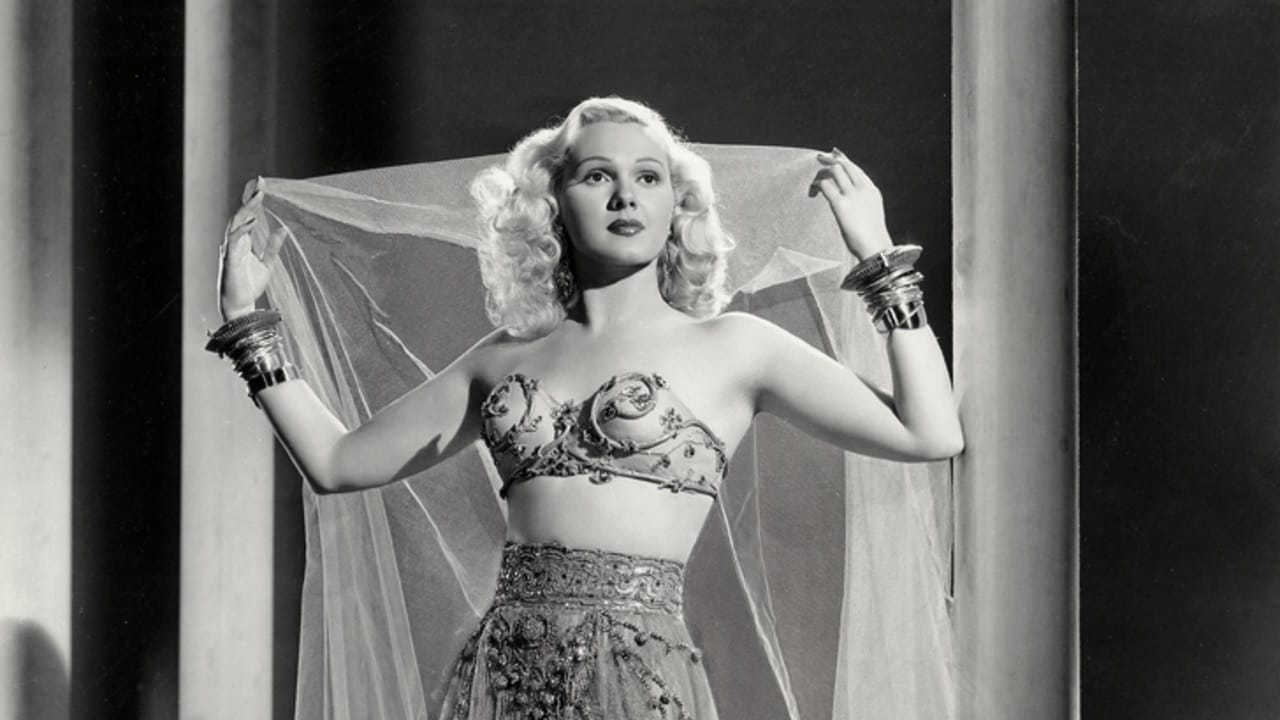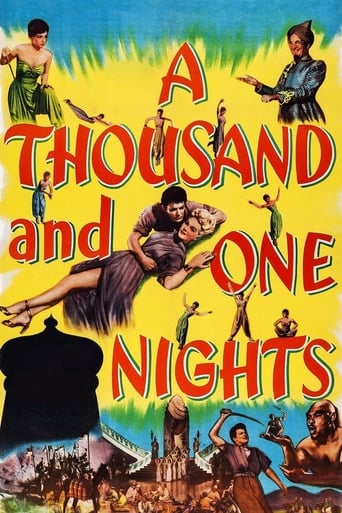



A different way of telling a story
This movie was so-so. It had it's moments, but wasn't the greatest.
View MoreThis story has more twists and turns than a second-rate soap opera.
View MoreThe storyline feels a little thin and moth-eaten in parts but this sequel is plenty of fun.
View MoreAlthough the Arabian Nights Technicolor fantasies of the 1940s and 1950s were mainly the domain of Universal Studios, the other Hollywood majors understandably jumped on the Oriental band wagon while it was big box-office, and this endearingly modernistic revamp of the mythical tale of Aladdin was Columbia's contribution to that WWII craze. Having first (and only) read about this one on Leonard Maltin's Film Guide and never encountering it on Italian TV in my childhood, I leapt at the chance of acquiring it on DivX but, as is becoming increasingly (and frustratingly) regular with this format, there were lip-synch problems which, thankfully, were corrected via conversion to DVD. But, enough of this techno-babble Aladdin is played by Columbia's star Cornel Wilde – he had just been Oscar-nominated for A SONG TO REMEMBER (1945) – who is curiously fourth-billed here; he even gets to sing several times (a talent of his that I had previously been unaware of if that was indeed his voice on the soundtrack); incidentally, I should be acquiring another somewhat obscure Wilde costumer very soon called STAR OF India (1954) which I intend to watch over the Christmas week. As I said in my introduction (and perhaps to differentiate itself from the rival Universal product), the film-makers also engaged the services of another currently hot commodity in bespectacled comedian Phil Silvers as Aladdin's pickpocketing sidekick. At first, I balked at his modern-day savvy personality (with in-jokes towards The Lone Ranger, liberal use of hip words like "groovy", etc.) but was eventually won over by his gauche schtick culminating in his hilarious Frank Sinatra transformation at the film's very end. Another asset to the film is the delightful (if belated) presence – as a mischievous female genie of the proverbial lamp – of the late (she died earlier this year aged 91!) Evelyn Keyes; naturally, she falls in love with her master Aladdin but, losing him to Princess Adele Jergens, she creates her own clone!Speaking of the Universal rivalry, I was surprised to see Dennis Hoey (best-known as the bumbling Inspector Lestrade of Universal's ongoing Sherlock Holmes series with Basil Rathbone and Nigel Bruce) in a dual rule as the villain, not to mention Rex Ingram reprising (albeit too briefly) his celebrated giant characterization from THE THIEF OF BAGDAD (1940)! Like its prototype ARABIAN NIGHTS (1942), this film was also looked on favorably by Academy Award voters in the technical categories: art direction-set decoration and special effects (mostly having to do with Silvers being unable to see Keyes and Wilde's transformation into a dog – another nod, I suppose, to that afore-mentioned Alexander Korda production).
View MoreHarry Cohn must have gotten a little jealous at all the money Universal was raking in with those Maria Montez/Jon Hall Arabian Nights films that they were grinding out. Cohn decided Columbia deserved a bit of that market itself.What Cohn was smart in doing was playing this one tongue firmly in cheek for his sand and sandal epic. Cornel Wilde, fresh from his Oscar nominated role as Fredric Chopin at Cohn's studio, cuts a romantic and dashing figure, playing Aladdin of Cathay for laughs in a way that more serious swashbuckling rivals like Tyrone Power and Errol Flynn would never have done. Wilde's in love with the forbidden blonde Arabian princess Adele Jergens, but it is forbidden for him to rise above his station. Cornel's going to need some supernatural help and he finds it in the person of the genie with a lamp, in this case not Barbara Eden, but the one who must have been her inspiration, Evelyn Keyes.Though she's crushing out on Wilde big time, Keyes does help him in his romantic quest and coincidentally works against plot by the dastardly twin brother of the sultan to usurp the throne. That would be Dennis Hoey who is clearly enjoying hamming up, both roles. Phil Silvers is around as well as the jive talking Abdullah who rumor hath it was born some 600 years ahead of his time. Part homage to The Thief of Bagdad and part Road to Morocco as well, A Thousand and One Nights is enjoyable enough because it doesn't take itself too seriously even as satire.But what about hard working Evelyn, what's her reward. Think The Palm Beach Story and remember she does have a magic lamp.
View MoreAladdin (Cornel Wilde) falls in love with Princess Armina (Adele Jergens). She loves him too but she can't marry a poor man. Aladdin finds a lantern, rubs it and our comes a female genie named Babs (Evelyn Keyes). Aladdin orders her to make him a rich prince so he will be able to marry the princess--but Babs starts to fall in love with Aladdin! Abdullah (Phil Silvers), Aladdin's buddy tags along.If you take the Arabian Nights stories seriously this will probably have you horrified. However if you take it for what it is (a fun, silly movie) you'll love it. It was shot in bright Technicolor with huge sets, a large cast and excellent special effects. It's obvious that Paramount spent a LOT of money on this. The script moves quickly and one-liners (mostly by Silvers) go flying left and right. Some of the lines are groaners but (more often than not) they're right on target.Acting--Wilde is tall, hunky and incredibly handsome. He even sings a few songs (!!!). Silvers could have very easily been annoying--but he's actually quite funny and full of life. Jergens and Keyes are both beautiful and good in their roles. Also Rex Ingram has a pointless (but interesting) cameo as another genie and Shelly Winters plays a harem girl! Cute, colorful, lavish and lots of fun. Worth catching. Perfect for the whole family.
View MoreColumbia Pictures may not have had the stars to populate this film like MGM or Warners would have, but they knew how to have some fun with what they had. Sure, it's splashed with expensive Technicolor and has lots of costumes and effects (the effects winning an Academy Award for Lawrence W. Butler), but its feeble cast features Evelyn Keyes, Cornel Wilde and Phil Silvers. Not exactly box-office, although Wilde was one of the hot new stars of 1945. But it's Keyes and Silvers who make this film enjoyable, even if their lack of star value keeps this film from being noticed today.It's the umpteenth variation of the 'Aladdin and the Lamp' story, but this one is hoked up with plenty of anachronisms, chiefly in the form of Phil Silvers who plays Aladdin's thief buddy as an All-American wiseguy complete with the latest 40's slang and a pair of modern eyeglasses. And when Aladdin gets hold of the famous lamp (after a scene wherein he and Silvers dodge a giant played by Rex Ingram, who virtually reprises his character from 1940's 'Thief of Baghdad') out pops the genie played by Evelyn Keyes. And she's a sassy sprite who likes to be called "Babs." Since she's invisible to all but the owner of the lamp, she gets to mess around with others and sling wisecracks and warnings at Aladdin, to his discomfort. Sandwiched between Silvers and Keyes, poor Wilde is nothing more than a handsome grinning prop. At least his fencing skills come into play in a climactic duel.The story includes the requisite villain, in this case played by Dennis Hoey (most famous as Inspector Lestrade in the Sherlock Homes series) in a duel role as a Sultan and his scheming twin-brother Prince. Adele Jergens plays the Sultan's daughter who naturally falls for Aladdin because he's so gorgeous and sings love songs to her (Wilde's singing voice dubbed). Jergens is not very interesting (looking like a pale imitation of Virginia Mayo) and to be honest, in my estimation, is strangely overshadowed by the striking looks of her chief maid played by Dusty Anderson. Neither of them became movie stars, but Anderson's looks and voice are so much more impressive than Jergens that it distracts from Wilde's pursuit of the Princess. In my view, why take a chance on being executed for trying to possess a moderately pretty Princess when the maid is a knockout, and likable too? (One small note: Shelley Winters plays a fellow handmaiden in this film, but good luck finding her. I think I spotted her in the back row of a group of maidens in a scene near the end of the film).Interesting line: Phil Silvers looks into a sorcerer's crystal ball and sees himself robbing someone. He quips to Wilde re: the Sorceror: "This guy has run into television and don't know it." Since no pretense is made that this is anything other than a silly romp, Silvers gets to gag it up with plenty of other current references, including the absurd ending wherein he croons a Sinatra tune ("All or Nothing at All" and using the actual Sinatra recording) to handmaidens in bobbysoxer footwear. Needless to say, this a fun movie, easy to like.
View More